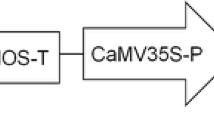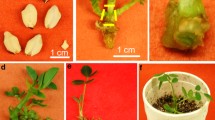Abstract.
A procedure for producing pineapple [Ananas comosus (L.) Merr.] transgenic plants was developed that involved selection by micropropagation in temporary immersion bioreactors (TIBs). Pineapple calluses ranging in size from 1.5 mm to 2.0 mm that were co-cultivated with Agrobacterium tumefaciens strains AT2260 (pIG121Hm) and LBA4404 (pTOK233) for 24 h produced the highest percentage (40%) of GUS+ calluses. Phosphinothricin and hygromycin, but not kanamycin, were effective selection markers in TIBs. Large-scale transformation experiments with AT2260 (pHCA58) and AT2260 (pHCG59) resulted in up to a 6.6% efficiency of transgenic plant recovery. TIB technology was found to be more efficient for transgenic plant selection than conventional micropropagation. Polymerase chain reaction and genomic Southern blot analyses confirmed the non-chimeric nature of the transgenic plants recovered from TIBs.
Similar content being viewed by others
Author information
Authors and Affiliations
Additional information
Electronic Publication
Rights and permissions
About this article
Cite this article
Espinosa, .P., Lorenzo, .J., Iglesias, .A. et al. Production of pineapple transgenic plants assisted by temporary immersion bioreactors. Plant Cell Rep 21, 136–140 (2002). https://doi.org/10.1007/s00299-002-0481-9
Received:
Revised:
Accepted:
Issue Date:
DOI: https://doi.org/10.1007/s00299-002-0481-9




